The Bagel Shop Café will repoen at 11:30 A.M. on April 29 for coffee and lunch as a sidewalk café. We have a new coffee blend served as espresso and drip and a new menu. so come check it out.
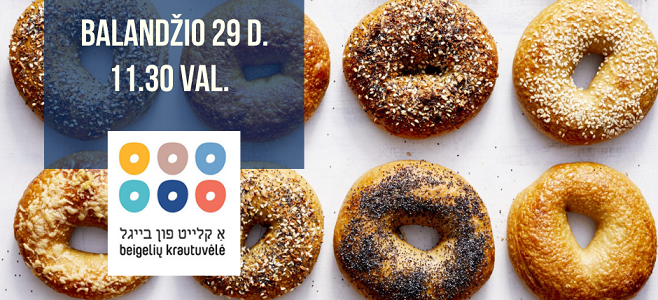

The Bagel Shop Café will repoen at 11:30 A.M. on April 29 for coffee and lunch as a sidewalk café. We have a new coffee blend served as espresso and drip and a new menu. so come check it out.

The Bagel Shop Café is looking for an experienced and an assistant barista. Candidates must be able to be legally employed in Lithuania and should be prepared to deal with customers in Lithuanian and Russian. Please send your CV to aiste@lzb.lt or call +370 611 52760.

Passover, the most important Jewish holiday which lasts for eight days, begins on March 27 this year. The date for celebrating Passover is set by the lunar calendar: the first full moon after the vernal equinox. The name of the holy day comes from “pesakh,” meaning passed over, recalling the story of the Angel of Death which passed over the Israelites before Moses led the slaves out of Egypt.
“The symbolic meaning of this holiday is that it wasn’t separate Jewish families which came out of Egypt, but a single, united Jewish people. The Jewish people throw off the yoke of slavery and leave in order to reach the Promised Land, and there create their nation,” Lithuanian Jewish Community chairwoman Faina Kukliansky explained.
Passover Traditions over the Millennia
Keeper of Jewish cultural and religious traditions Natalija Cheifec said although the exodus from Egypt occurred more than 3,300 years ago, Passover traditions have remained almost unchanged over the many centuries. The main feature of the eight-day holiday is the seder dinner when the Hagada is read out, prayers are made and people sit at the seder table and eat from the seder plate, or ke’are.
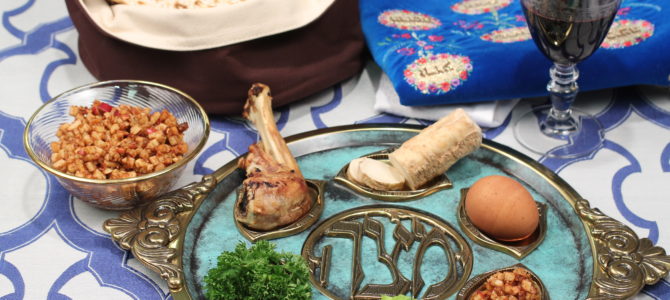
The Bagel Shop Café is offering prepared Passover seder meal kits this year. One package costing 45 euros serves two but contains enough to share with children as well. Orders will be accepted until March 24. To order, go to the internet form in Lithuanian at http://bit.ly/Pesach_užsakymai
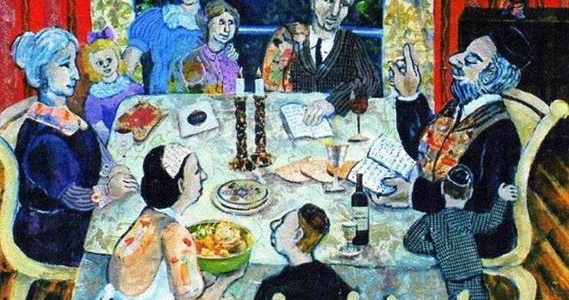
The Bagel Shop Café at the Lithuanian Jewish Community at Pylimo street no. 4 in Vilnius is offering Passover matzo for sale from March 15 to March 26. The café will operate from 10 A.M. till 3:00 P.M. from Monday to Friday. A one-kilogram box of matzo costs 5 euros and payment may only be made using a bank card.

This year again the Lithuanian Jewish Community is asking members to order matzo via internet with home delivery. The cost for one one-kilogram box of matzo is six euros. The LJC is partially subsidizing delivery costs. This is only being offered in Vilnius for the time being and orders will be taken till March 25.
How to Order and Pay
1. Fill out the form at https://forms.gle/wRSoZ1Sf4kvVPxFj7
2. Open your internet banking profile.
3. Transfer funds to the Lithuanian Jewish Community at account number LT09 7044 0600 0090 7953 to the amount of matzo you wish to purchase.
You must indicate in the payment field the information we need to deliver the matzo to you, namely, your name and surname, exact postal address, telephone number, email address and the exact number of boxes you are ordering.

Photo: Tarbut Gymnasium students in Pabradė prepared for the Purimspiel, March 3, 1939. Courtesy YIVO.
Purim starts February 25 this year. Purim is the happiest of Jewish holidays dedicated to remembering the miraculous salvation of the Jewish people from destruction. Traditionally the triangular pastry Hamatasch are eaten on this day and the Lithuanian Jewish Community will share them with the leaders of the state this year as well.
“The essence of Purim is to celebrate life in all its fullness. This is a happy holiday, on this day you need to eat deliciously and much, especially the traditional hamantaschen pastry. This traditional treat reminds us that the plans of evildoers often turns back upon them, while wise rulers always receive the help to make the right decisions. We will also be sending hamantaschen pastry to the leaders of the country, wishing them to make wise decisions beneficial to the people,” Lithuanian Jewish Community chairwoman Faina Kukliansky said.
Vilnius Jewish Religious Community director Simas Levinas recalls the Purim story which reaches back into biblical times when the Jewish people were exiled from Jerusalem to Babylon. Although the king married the Jewish beauty Esther, the magnates and bureaucrats of Babylon really hated the Jews in their country, who weren’t there by their own choice. The vizier Haman came up with a plan to exterminate all Jews and cast lots (פור) to discover an auspicious time for this.

The Bagel Shop Café will make hamantash available for Purim from February 23 to 25, made in the traditional manner with poppy seeds and raspberry jam. The cost will be 12 euros per kilogram (about 30 to 35 individual hamantashen) and smaller orders are also possible. Please reserve your pastry now or at least by February 23 so we’ll know how many to make. The Bagel Shop Café itself is closed for repairs so customers will be able to pick up their orders in the foyer at the main entrance to the Lithuanian Jewish Community in Vilnius. Pick-up will begin on February 23 and run till February 25, from 12 noon to 4:00 P.M. Payment may only be made by bank card.
Reservations: https://forms.gle/YhmP2nt82uoUALbc8

by Wailana Kalama

After a long absence, the Jewish staple has returned to the Lithuanian capital
Most food historians place the origin of the bagel somewhere vaguely in the Jewish alleys of the Polish-Lithuanian Commonwealth. In those days in Lithuania’s capital, Vilnius–also known as Vilna, the city once dubbed the “Jerusalem of the North”–bagels were ubiquitous, sold on the streets, and in the bakeries and markets. In modern times, however, the bagel had all but been erased from popular memory. Until now.
For centuries, the city’s Old Town was home to a thriving community of Litvaks, as local Jews referred to themselves. The district was lauded for its cultured elite and a Great Synagogue that attracted scholars from all over Europe. All that changed with the Holocaust, during which 95% of Lithuanian Jews were deported and murdered. Now, all that remains in the Old Town are monuments to what once was: street signs in Yiddish, inscriptions educating about the ghetto, a bust of the famed intellectual Vilna Gaon.

After a short break, the Bagel Shop Newsletter has returned with a new and much-anticipated end-of-2020 issue. The magazine has shifted to a newsprint folded edition, so the layout is slightly different from earlier issues. We hope you enjoy.
Beigelių krautuvėlė-EN-internet
by Vytautas Bruveris, lrytas.lt
The country is marking the end of the ceremoniously declared Year of the Vilna Gaon and Litvak History, while the Lithuanian Jewish Community is looking at its front door and thinking it might have to leave its home. Because disagreements with state institutions are driving the Community from its longtime building in the center of the Lithuanian capital, located near the remains of Jewish Vilna and the city’s working synagogue.
Bailiffs and bricklayers in broad daylight have walled off one of the corridors in the building housing the LJC. This is the grotesque turn of events these days resulting from continuing disagreements between the LJC and the Vilna Gaon Jewish History Museum along with the Lithuanian Ministry of Culture. And even before this there were also episodes which seem rather odd, for example, letters from the museum to the members of the executive board of the LJC with accusations against the latter’s leadership, attempting to put political pressure directly upon the ethnic community/
With the new wall built, the LJC is now deciding on its future course: whether to dive headlong into legal battles, or simply pack its bags and hit the street. So why is all this happening? Because of disputes on how to share the courtyard which both the museum and the LJC, housed in the same building, claim. Instead of trying to act as moderator and as a moderating force, the Lithuanian Ministry of Culture has done the opposite. The neighbors are there next to each other, but separate.
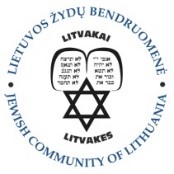
The International Day for Tolerance will be marked around the world on Monday, November 16. The Lithuanian Jewish Community has prepared a virtual celebration called Darna which will run from 10 A.M. to 10 P.M. that day, including well-known performers Jurgis Didžiulis, Erca Jennings, Afrodelic and Paulius Kibauskas. It will also include yoga and meditation activities, a discussion on the topic of tolerance and other activities.
The first Darna festival for celebrating the International Day for Tolerance invites the public to celebrate tolerance, harmony and concord, and to do so through the creation of art and community. The LJC had planned to hold the celebration as a real event, but decided to make it virtual because of concerns about the corona virus and to make an entire day’s worth of events available to those homebound.
Event organizer Rafael Gimelstein said: “We are trying to encourage the celebration of human ties and a harmonious and tolerant life through this event. We wanted to bring together all people who think the same way and to commemorate these values through creative work. To show we have very diverse and talented people who are united by a shared idea, and that tolerance is a very topical idea to them.”

The Lithuanian Jewish Community invites you to join millions of other Jews around the world and join the #ShabesatHome initiative. The Lithuanian side of the initiative known as #Šabasnamuose will include the Sholem Aleichem ORT Gymnasium and the Vilnius, Kaunas, Panevėžys, Šiauliai, Ukmergė and Švenčionys communities are invited as well to join up by internet right now, Friday, November 6. Vilnius Jewish Religious Community chairman Simas Levinas, LJC chairwoman Faina Kukliansky and her granddaughter Esther will also be on hand.
Social media announcements: #ManoŽydiškaKelionė #ŽydųKultūrosMetai #ShabesatHome #ŽyduKultūrosDiena #Šabasnamuose #KeepingItTogether #GeroŠabato
For more information, contact Dovilė Rūkaitė at projects@lzb.lt (before the sun goes down).
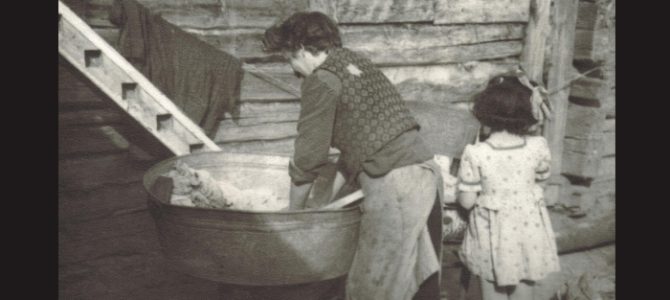
Psychologist Dr. Ruth Reches will present her book called “Holokaustą patyrusių asmenų tapatumo išgyvenimas” [The Experience of Identity by People Who Survived the Holocaust] at a special event at 6:00 P.M. on Monday, October 19, 2020, at the Bagel Shop Café at Pylimo street no. 4 in Vilnius. The event in Lithuanian will include a panel moderated by Vytautas Magnus University lecturer and philosopher Algirdas Davidavičius. Guests will be asked to wear masks. Please report your intention to attend by sending an email to info@lzb.lt
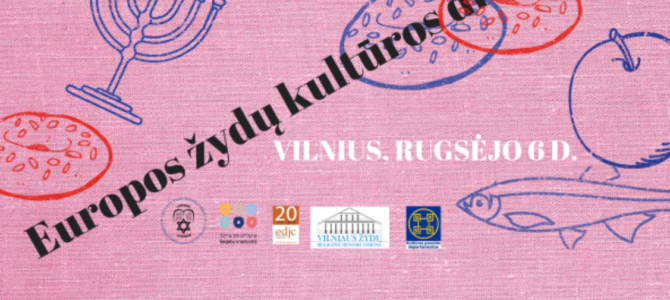
The Lithuanian Jewish Community is continuing the tradition of marking the annual event European Days of Jewish Culture, this time for the fifth year, with a program of events in Vilnius scheduled for Sunday, September 6, 2020.
All parts of the event program are free and open to the public. The number of participants has been limited this year due to health concerns so please register as soon as possible.
For cooking lessons, register by sending an email to kavine@lzb.lt
For the Jerulita tour, register by sending an email to travel@jerulita.lt
To register by internet, click here.
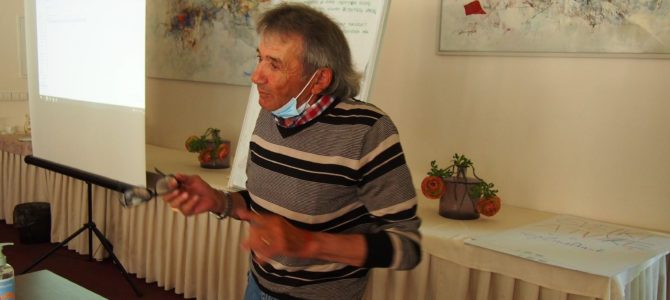
The Švenčionys region of Lithuania is a multicultural place where Lithuanians live alongside Poles, Russians, Belarussians, Jews and people of other ethnicities.
The Švenčionys Jewish Community was reconstituted in 2013. It is now headed by the energetic Švenčionys native Moshe Shapiro (aka Moisiejus Šapiro).
There was a large Jewish community living in the Švenčionys region in the period between the two world wars. In fact there were five synagogues operating there.
Jews there set up an herbal pharmaceuticals factory and different workshops in the center of the town of Švenčionys. Jewish effort, initiative and expertise were involved in all fields of production and business.
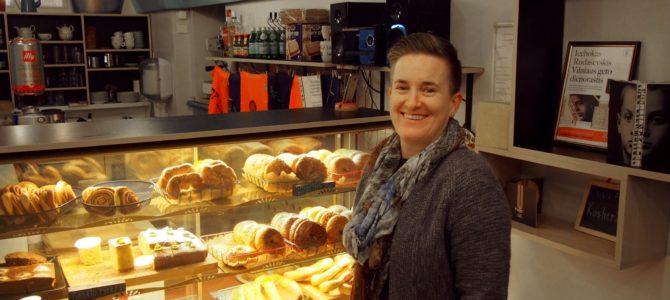
Just before quarantine was announced the Bagel Shop received an important visitor. The interview done several months ago remains just as important and perhaps even more so now. We spoke about the importance of ethnic food to Jews living in Lithuania and about a people’s right to have ethnic foods. We await the re-opening of the Bagel Shop Café with bated breath and hope to continue this conversation in front of an audience.
Bagel Shop Interview with Meghan Luckett, Cultural Attaché at the US embassy in Vilnius
Interview by Dovile Rūkaitė, LJC project manager.
Do you like bagels? What’s your favorite kind?
Yes, of course we love bagels. My favorite are everything bagels, we buy them at your bagel shop and in the market and eat them almost every week. We make bagel sandwiches with baked egg, spices and all kinds of stuff. One of our colleagues is a great cook, she makes us homemade bagels. Once we brought her some from Trader Joe’s and she made us excellent everything bagels. My wife is a great cook, she bakes sometimes, but we usually buy them because they are very good.

Lithuanian Jewish Community administrative secretary Liuba Šerienė would like to send a big thank-you to Social Department director Michailas Segalas and staff members Ema Jakobienė, Ninel Skudovičiūtė, Rokas Dobrovolskis and Neringa Stankevičienė and colleagues, and to Michailas Tarasovas, Aušra, Snieguolė, Danutė Lena, Žana and Sonia for their great work helping our Social Department clients and senior citizens. Thank you so very much.

Community chairwoman Faina Kukliansky. Photo: Blanka Weber
by Blanka Weber
The country’s Jewish community is watching the time of pandemic with alarm
Faina Kukliansky is currently managing her life and that of her members from her home office in Vilnius. “This is a time that demands everything from us,” the 65-year-old chairwoman of the Lithuanian Jewish Community says.
This is a time when preparations for Passover would be underway normally. The Bagel Shop next to the Community building on Pylimo street is now only open for a few hours and only accepts cards for payment. Cash is forbidden. There are strict rules here, too. Matzo will be distributed to Community members here and should be delivered in the next few days.

The Lithuanian Jewish Community has set up a safe way to get matzo for Passover via the Bagel Shop Café. Payment will be by bank card exclusively. The cost for a 1-kilogram box is 5 euros, and for a 454-gram bag of matzo flour the price is 3 euros. Pick-ups can be made between the hours of 10:30 A.M. to 2:30 P.M. from March 25 to April 4, presumably excluding the Sabbath. Please call 8 685 06 900 for more information.